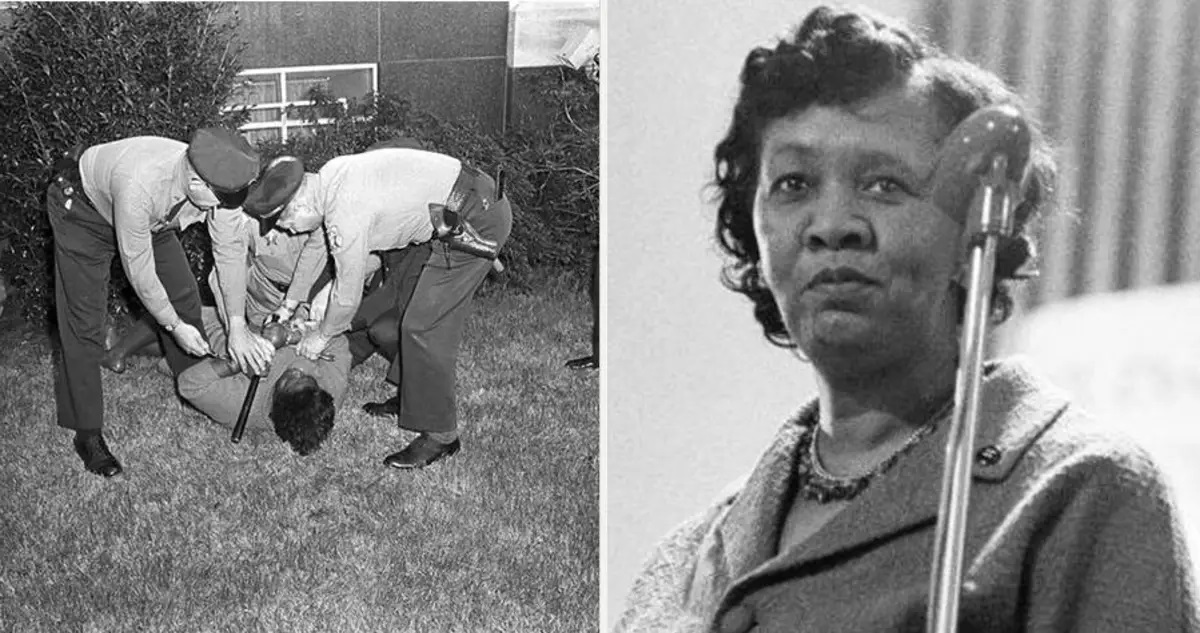
Annie Lee Cooper is a name that resonates with courage and determination in the fight for civil rights. Born in Selma, Alabama, she became a pivotal figure during the 1965 Selma Voting Rights Movement. Her bravery was immortalized when she stood up to Sheriff Jim Clark, an act that highlighted the brutal reality of voter suppression. But who was Annie Lee Cooper beyond that iconic moment? This blog post delves into 35 intriguing facts about her life, shedding light on her early years, activism, and lasting impact. Get ready to be inspired by the story of a woman who refused to be silenced.
Key Takeaways:
- Annie Lee Cooper was a courageous activist who fought for African American voting rights. Her defiance against injustice inspired others and led to the passage of the Voting Rights Act of 1965.
- Cooper's legacy continues to inspire new generations with her resilience, determination, and love for gardening and cooking. She is remembered as a hero who stood up for justice and equality.
Who Was Annie Lee Cooper?
Annie Lee Cooper was a significant figure in the American Civil Rights Movement. Her courage and determination played a crucial role in the fight for voting rights for African Americans.
- Born on June 2, 1910, in Selma, Alabama, Annie Lee Cooper grew up in a time of intense racial segregation.
- She moved to Kentucky at the age of 14 to live with her sister and pursue better educational opportunities.
- Cooper worked various jobs, including as a nurse's aide, to support herself and her family.
- In 1962, she returned to Selma, where she became actively involved in the Civil Rights Movement.
- She joined the Dallas County Voters League, an organization dedicated to registering African American voters.
The Fight for Voting Rights
Annie Lee Cooper's most famous moment came during the 1965 Selma Voting Rights Movement. Her actions brought national attention to the struggle for voting rights.
- On January 25, 1965, Cooper attempted to register to vote at the Dallas County Courthouse.
- Sheriff Jim Clark, known for his brutal enforcement of segregation, confronted her.
- When Clark poked her in the neck with a billy club, Cooper struck him back, knocking him to the ground.
- This act of defiance led to her arrest and imprisonment.
- Her courage inspired many others to join the movement and fight for their rights.
Legacy and Recognition
Annie Lee Cooper's bravery and determination left a lasting impact on the Civil Rights Movement. Her legacy continues to inspire future generations.
- The events in Selma, including Cooper's actions, led to the passage of the Voting Rights Act of 1965.
- This landmark legislation prohibited racial discrimination in voting, significantly increasing African American voter registration.
- Cooper's story was highlighted in the 2014 film "Selma," where Oprah Winfrey portrayed her.
- She received numerous awards and recognitions for her contributions to civil rights.
- Cooper passed away on November 24, 2010, at the age of 100.
Personal Life and Character
Beyond her activism, Annie Lee Cooper was known for her strong character and dedication to her community.
- She was married twice and had no children.
- Cooper was deeply religious and a member of the Tabernacle Baptist Church in Selma.
- She was known for her kindness and willingness to help others in need.
- Despite facing numerous challenges, she remained optimistic and hopeful for a better future.
- Cooper's resilience and determination made her a beloved figure in her community.
Impact on the Civil Rights Movement
Annie Lee Cooper's actions had a profound impact on the Civil Rights Movement, particularly in the fight for voting rights.
- Her defiance against Sheriff Jim Clark became a symbol of resistance against racial oppression.
- Cooper's arrest drew national attention to the injustices faced by African Americans in the South.
- Her story was widely covered in the media, bringing greater awareness to the Civil Rights Movement.
- Cooper's bravery inspired other activists to continue their fight for equality.
- She played a key role in the success of the Selma to Montgomery marches, which were pivotal in the passage of the Voting Rights Act.
Remembering Annie Lee Cooper
Annie Lee Cooper's legacy continues to be honored and remembered by those who value justice and equality.
- The city of Selma has commemorated her contributions with various events and tributes.
- Cooper's life and actions are taught in schools as part of the history of the Civil Rights Movement.
- Her story serves as a reminder of the importance of standing up against injustice.
- Cooper's courage and determination continue to inspire new generations of activists.
- She is remembered as a hero who fought tirelessly for the rights of African Americans.
Fun Facts About Annie Lee Cooper
Annie Lee Cooper's life was filled with interesting and lesser-known facts that add depth to her story.
- She loved gardening and often spent her free time tending to her plants.
- Cooper enjoyed cooking and was known for her delicious homemade meals.
- Despite her serious activism, she had a great sense of humor and loved to make people laugh.
- She was an avid reader and enjoyed learning about history and politics.
- Cooper's favorite color was blue, which she often wore to symbolize peace and tranquility.
Annie Lee Cooper's Legacy
Annie Lee Cooper's story is a testament to the power of resilience and courage. Her determination to fight for voting rights in the face of adversity has left an indelible mark on American history. Born in 1910, Cooper's life spanned a period of significant social change. Her most famous act of defiance, punching Sheriff Jim Clark, highlighted the brutal reality of the Civil Rights Movement. This act wasn't just a moment of personal bravery but a catalyst that drew national attention to the struggle for equality.
Cooper's legacy continues to inspire new generations to stand up against injustice. Her story reminds us that one person's courage can spark monumental change. As we reflect on her contributions, it's clear that Annie Lee Cooper's fight for justice and equality remains as relevant today as it was during her lifetime. Her legacy lives on, urging us to continue the fight for a fairer world.
Frequently Asked Questions
Was this page helpful?
Our commitment to delivering trustworthy and engaging content is at the heart of what we do. Each fact on our site is contributed by real users like you, bringing a wealth of diverse insights and information. To ensure the highest standards of accuracy and reliability, our dedicated editors meticulously review each submission. This process guarantees that the facts we share are not only fascinating but also credible. Trust in our commitment to quality and authenticity as you explore and learn with us.


